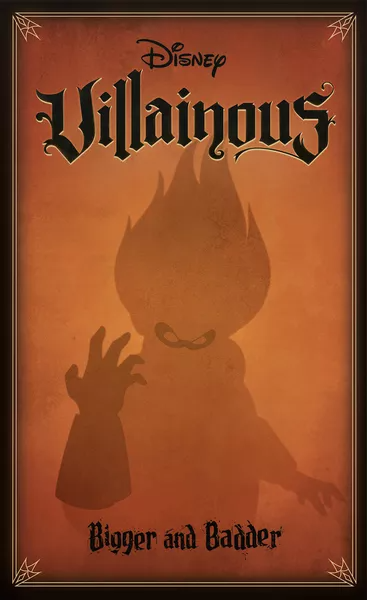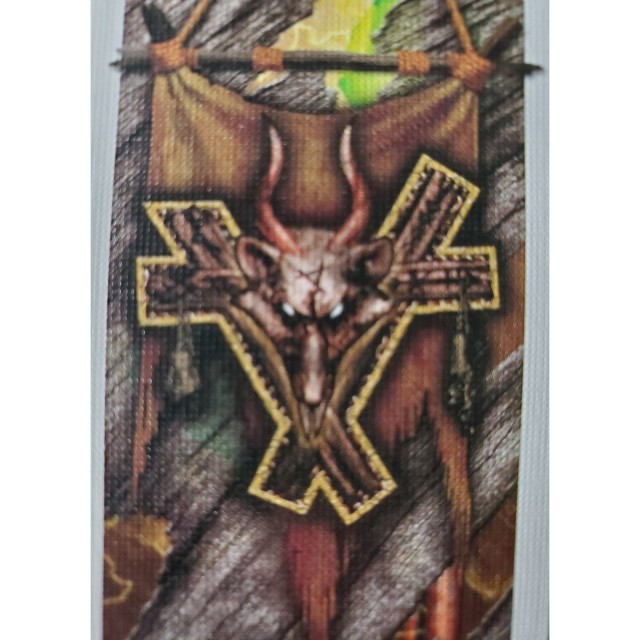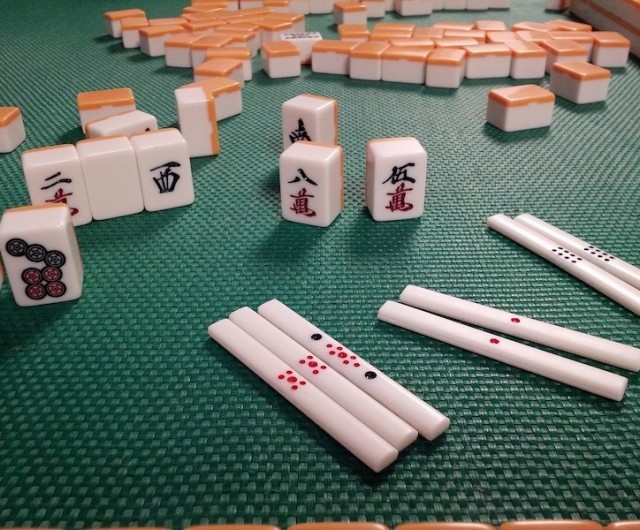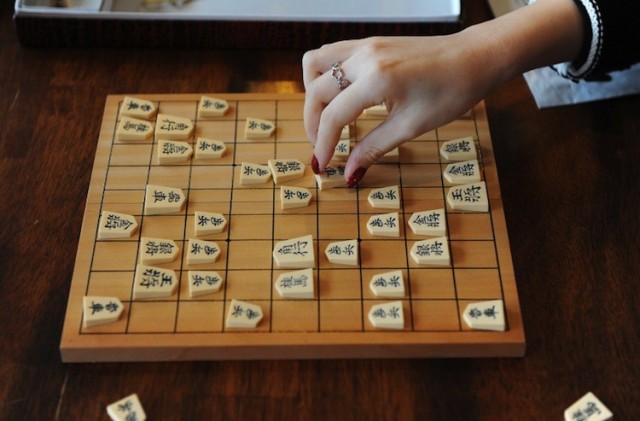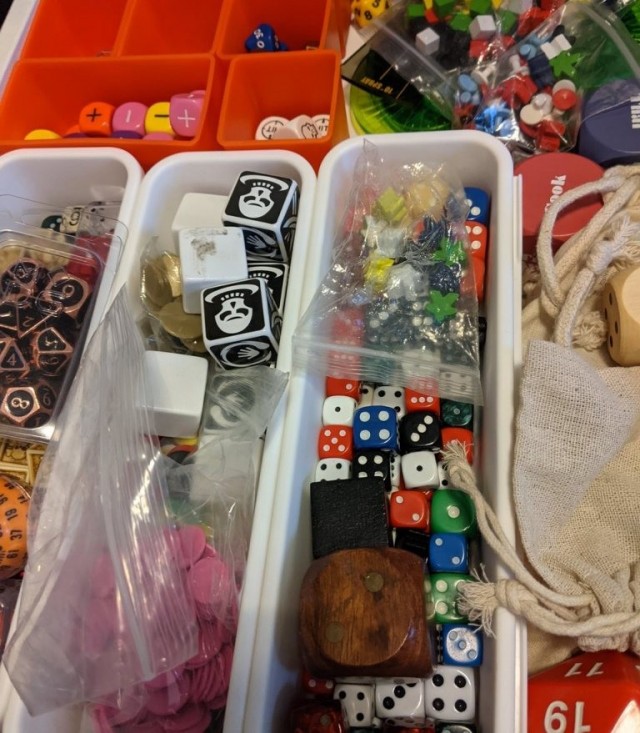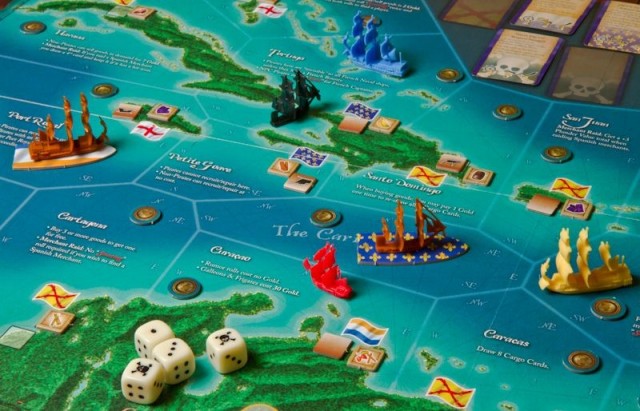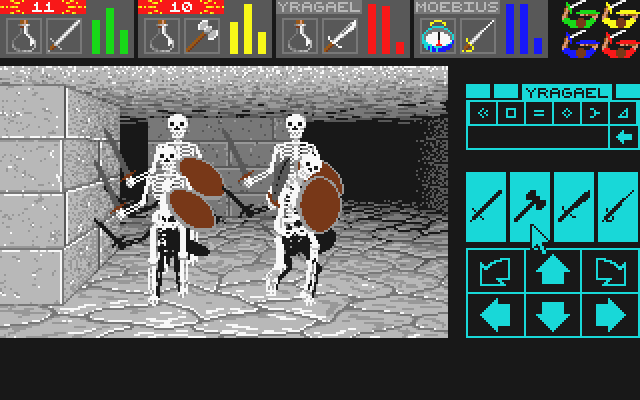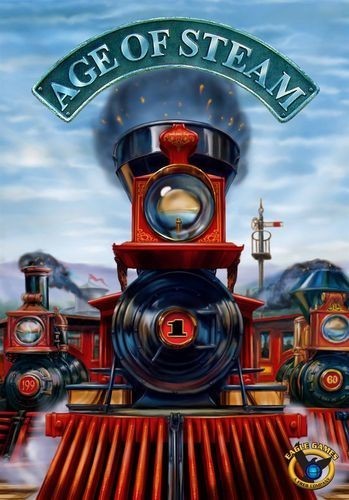A while back you may recall I did a piece on why I gave up role-playing games. As part of the discussion which that generated, people started throwing ideas at me for some more moder, streamlined, narrative-based games that I ought to check out. And I have to admit I was pretty intrigued by some of these. Not to the point where I’ve actually gone out and played one, that would be a pretty fast change of opinion, even for me. But certainly enough that I went out and bought a couple. And almost inevitably, as soon as I’d read the first one, it made me think about lessons that could be applied to board games.
The role-playing game in question is Dread, an independently designed and published game. It’s an open-genre horror game, as you might guess from the name, but what attracted me to it is the central, signature mechanic. At the start of the game a Jenga tower is built in the middle of the table, and every time one of the players wishes to do something challenging, the games master can ask them to pull one or more blocks from the tower. If they succeed, so does the character. If they refuse, the character fails the action. But if they try and knock the tower over then something terrible happens to the character and they’re eliminated from the game. It’s an utterly, brilliantly ingenious way to mimic the slow build-up of tension followed by a brutal denouement that’s typical of a horror tale. And as an aside it demonstrates what I’ve always maintained - that there are mechanical ways of simulating horror in a game if the designer is bold and creative enough. But that’s not what this column is about.
What struck me about this particular idea is the complete disconnect between the mechanic itself and what it’s trying to simulate. In reality a stack of wooden blocks falls over. In the game your character has just become irrevocably insane after witnessing an alien horror from another dimension, or has had his face chewed off by a werewolf. There’s no linkage at all between the fact and the fiction and yet the mechanic works incredibly well. Of course this is a role-playing game so there’s going to be a huge level of narrative to try and fill in the gaps but this isn’t just a mere gap, it’s a gulf, and entire world apart. And even by the standard of role-playing games a disconnect this huge is unusual. For combat mechanics, for example, there’s usually some attempt to bring in factors like the armour a character is wearing, the weapons being used and the relative skill levels of the protagonists. But there’s nothing like that here, no linkage at all and yet it functions, and functions brilliantly. It is perhaps one of the ultimate examples of a thematic mechanic in a game.
But when we, as board gamers, talk about theme (or the lack of it) what we’re almost always talking about is a simulation of the real world (or fantasy) implications of that theme. Games that get flack for being themeless tend to be ones where the mechanics don’t in any way link to the supposed theme of the game, Dominion being a brilliant example. How does building a deck, from which you’re initially limited to a hand of five cards, really connect mechanically to the supposed theme of gradually building up a powerful medieval kingdom and competing with your neighbours? It doesn’t, of course, and that’s partly why I grew bored with it quickly. On the other hand games that we celebrate for their comprehensive theme tend to have very strong ties between the mechanics and the theme, say Dune for example. I’ll bet my bottom pound sterling that when it’s re-design Rex eventually hits the shelves it’ll either have changed mechanically in significant ways from it’s predecessor or it’ll be re-implimenting what is quite clearly a copy of the Dune universe under a different name.
But when you scrutinize this assumption it falls apart. The games that offer the best simulation - and under the usual terms of discussion, the best theme, are wargames and yet we don’t usually see them being held up as shining examples of thematic games. Indeed many people who like thematic games but reject wargames do so because they feel that the level of mechanical simulation required makes them overly-complex to the point of tediousness. When you consider this the contradiction becomes obvious: gamers who claim to love theme but reject the most thematic games of all because they involve too much work in implementing that theme. On the flip side you’ve got games like Titan and Arkham Horror which, mechanically, are semi-abstract but yet which get lumped together with thematic games and which, in the case of Arkham Horror at least, are frequently celebrated for the excellent narrative and sense of immersion that they create.
I’ve been aware of this for a long time now, but I’ve never written about it before because I could never quite put my finger on what the problem was, how a game could feel deeply connected to its theme when its mechanics bore little relation to what it was trying to portray. Dread finally gave me the answer: there’s more than one kind of simulation. We tend to focus down on simulating the mechanical implications in the real or imaginary world in which the game is set, but what about simulating the emotional consequences within that world instead? That’s what Dread is doing. It tosses aside all the usual thematic trappings that try and make the game appear real and goes straight for the jugular and tries to make it feel real instead. Same end result, but a much, much more effective approach.
And it makes sense. After all, when you really consider it all games are ultimately fairly abstract. Even something absurdly over detailed like Campaign for North Africa doesn’t offer an experience akin to Montgomery’s or Rommel’s time commanding in desert warfare. For all the detail and decisions that it encompasses, it can’t simulate the stress of trying to make those decisions under time pressure or the emotional impact of knowing the price of failure. No mechanical simulation ever can. Instead, unless you’re particularly interested in the command and control structures of the armies that clashed over north Africa in 1941, it makes sense to bypass all that detail and try and do something else entirely that actually does induce a measure of stress and worry in its participants. You could argue that Rommel in the Desert manages this to some degree: it’s certainly a more playable game with a much higher emotional impact than most games about the war in the desert.
Looked at from this angle, it seems almost incredible that designers and fans haven’t taken this approach more often before, especially when it comes to thematic games. If we’re looking for drama and narrative what do we really care about the mechanical implications of, say, slaughtering orcs or the political processes of corrupt dictatorships. I think the moment has finally arrived though when a more abstract approach to the thematic game is becoming the norm. Games like Wrath of Ashardalon and Junta: Vive el Presidente have shown how themes we once assumed required immense mechanical detail to implement properly can function and be as fun as ever with the added bonus of being much easier to learn and much faster to play. Indeed if we really want drama and narrative then arguably more rules and play time can get in the way, especially in genres where an epic feel isn’t a pre-requisite. It’s taken a while to get to this point in design terms and I’m delighted with the result but there’s still more deadwood to be cut out before we approach the purity of something like Dread.
- Analysis
- Atmosfear
Atmosfear
Hot
MT
Matt Thrower
Updated
9503
0
There Will Be Games

Discuss this article
Log in to comment Games
Games How to resolve AdBlock issue?
How to resolve AdBlock issue? 
